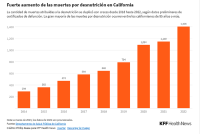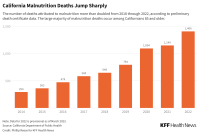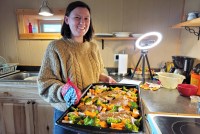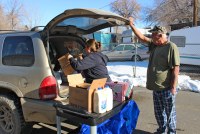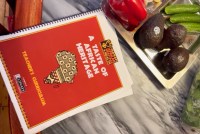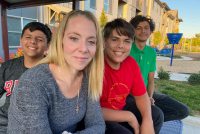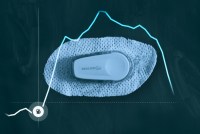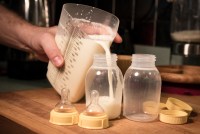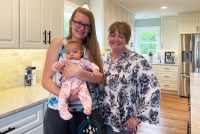Latest KFF Health News Stories
More States Legalize Sales of Unpasteurized Milk, Despite Public Health Warnings
Distrust of public health authorities, who say drinking raw milk is dangerous, fuels demand for unpasteurized milk products, leaders on both sides of the issue say.
Pregúntale a chatbot: ¿qué hay para cenar?
Los usuarios de ChatGPT están entusiasmados con las capacidades del programa y con la idea de que podría simplificar las tareas cotidianas. Pero hay dudas.
Ask a Chatbot: ‘What’s for Dinner?’
The AI program ChatGPT can save time and energy spent meal planning, especially for people with dietary restrictions. But be sure to double-check its work, users say.
Aumenta el número de californianos mayores que muere por desnutrición
Las muertes atribuidas a la desnutrición aumentaron más del doble, de unas 650 en 2018 a aproximadamente 1,400 en 2022, según datos preliminares de certificados de defunción del Departamento de Salud Pública estatal.
The Rate of Older Californians Dying of Malnutrition Has Accelerated
Californians 85 and older are especially susceptible to malnutrition. They accounted for almost three in five malnutrition deaths in the state last year.
Fresh Produce Is an Increasingly Popular Prescription for Chronically Ill Patients
Fresh produce prescription programs are getting a boost in Montana as a way of helping people with chronic conditions such as diabetes and high blood pressure. The approach may be a model for other rural states to promote healthy eating in food deserts.
Fin de beneficios extra de SNAP por la pandemia amenazan la seguridad alimentaria en zonas rurales
Un mayor porcentaje de personas depende de SNAP en áreas rurales en comparación con las áreas metropolitanas. Y esas zonas ya tienen tasas más altas de inseguridad alimentaria y de pobreza.
Looming Cuts to Emergency SNAP Benefits Threaten Food Security in Rural America
In a few weeks, pandemic-era emergency boosts to SNAP benefits, formerly known as food stamps, will be rolled back across 32 states, putting more pressure on food pantries to fill the gaps and exacerbating challenges for rural areas, where a greater share of people are enrolled in the program compared with metro areas.
Seasonal Cooks’ Secret Sauce: Heaping Nutrition and Cultural Zest
Two “nutrition ambassadors” from Oldways, an organization that makes tradition and pride centerpiece ingredients in food education, invite KHN into their kitchens for a peek at A Taste of African Heritage dishes to accompany holiday celebrations.
Colorado Voters to Decide Whether All Schoolkids Get a Free Lunch
In September, a popular pandemic benefit expired: free school lunch for all children attending public schools. Some states are stepping up to try to keep the free food available, and it is on the ballot next week in Colorado.
You may have seen the ads that promise weight loss and better health — phone apps, rings, and other devices — by giving you data on how your body reacts to food, exercise, and sleep. Is this information enough to help consumers achieve their goals?
La nueva generación de medicamentos para la pérdida de peso es prometedora, pero tiene un precio
Algunos pacientes, según los especialistas en medicina de la obesidad, experimentan una disminución de la presión arterial, un mejor control de la diabetes, menos dolor en las articulaciones y un mejor sueño gracias a estos nuevos tratamientos.
New Generation of Weight Loss Medications Offer Promise — But at a Price
People now have at their disposal more medicines that are effective at reducing weight, but none can counter obesity alone. One big problem: Insurance coverage remains spotty, and the costly drugs may be needed long term.
Índice de masa corporal: una medida errónea del peso que afecta el tratamiento de la obesidad
Los tratamientos actuales para la obesidad y los trastornos alimentarios, y sus costos, muchas veces se basan en esta medida que no está amparada en la ciencia.
BMI: The Mismeasure of Weight and the Mistreatment of Obesity
The human body mass index — a simple mathematical equation — is tied to a measure of obesity invented almost 200 years ago. On the downside, it can stand between patients and treatment for weight issues. It particularly mismeasures Black women and Asians.
Los pediatras y funcionarios federales de salud señalan que cuando la mayoría de los niños cumple un año, pueden comenzar a beber leche de vaca o un sustituto de la leche a base de plantas sin azúcar.
Formula May Be Right for Infants, but Experts Warn That Toddlers Don’t Need It
Sales of formulas designed for toddlers increased in recent years, but health experts warn parents that, generally, once children reach their 1st birthday, they are fine with cow or plant milk and don’t need the expensive, high-calorie products. And doctors say toddler formula should not be given to infants.
California y Nueva York buscan frenar la venta de píldoras para adelgazar a menores
Si ambas medidas se convierten en ley, sus defensores esperan que den impulso a la restricción de la venta de píldoras dietéticas a niños y adolescentes en más estados.
California and New York Aim to Curb Diet Pill Sales to Minors
California and New York would be the first states to require anyone under 18 to obtain prescriptions to purchase over-the-counter weight loss products, which some research has linked to eating disorders.
The Search for Scarce Formula Is Worse for Rural Families on WIC
Constraints imposed by the Special Supplemental Nutrition Assistance Program for Women, Infants, and Children, known as WIC, that prevent recipients from using benefits to buy formula across state lines weigh on families as the nationwide formula shortage drags on.





